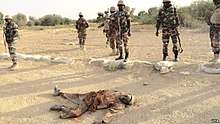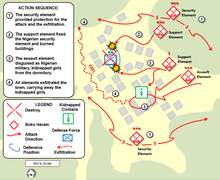Operation Turus
Operation Turus is the code name of the British military operation to assist Nigeria during the Boko Haram insurgency. It was launched in April 2014 by Prime Minister David Cameron in response to the Chibok schoolgirls kidnapping.
| Operation Turus | |
|---|---|
| Part of Boko Haram insurgency and the Chibok schoolgirls kidnapping | |
 Nigerian troops during the Boko Haram Insurgency. | |
| Location | |
| Date | April 2014 – Present |
| Executed by | |
Background
From 2009, Boko Haram, a jihadist terrorist organisation based in northeastern Nigeria, waged an insurgency in an attempt to institute an Islamic caliphate in Nigeria. By 2014, violent attacks perpetrated by the group had killed tens of thousands of people. A government crackdown ensued which saw a state of emergency declared in Borno, Yobe and Adamawa.[1] Under pressure, Boko Haram was forced to retreat to rural, mountainous areas where they began to target civilians.[2] Their numbers were bolstered by Islamist militants fleeing from nearby Mali due to a French counter-insurgency operation there.[3][4]
In 2010, in opposition to Western education — which it claimed detracted from Islamic teachings — Boko Haram began to target schools. The group was known for targeting female students, which it believed should not be educated and instead used as cooks or sex slaves.[3]
Attacks on British citizens
In 2011, Boko Haram abducted a British citizen along with an Italian citizen in Birnin-Kebbi and threatened to execute them unless demands were met. The UK launched a rescue mission carried out by the special forces unit, the Special Boat Service. The rescue attempt failed, resulting in the execution of both hostages.[5][6] In another incident, Ansaru, an off-shoot of Boko Haram, kidnapped seven construction workers, including one Briton in February 2013. The hostages were executed preemptively in March after the captors mistakenly believed British military deployments in nearby Mali (which were in support of Operation Newcombe) were part of a rescue operation.[7][8]
In 2014, the group was blamed for 4,000 deaths and it received support from other Islamist terrorist organisations, including al-Qaeda in the Islamic Maghreb and Al-Qaeda in the Arabian Peninsula.[3][9]
Chibok schoolgirl kidnapping

On 14 April 2014, Boko Haram kidnapped 276 female students from a secondary school in Chibok, Nigeria. In the days following, the Nigerian military announced most of the girls had been freed or had escaped, however parents claimed their children remained unaccounted for. Many parents ventured out to search for their children and claimed they saw no evidence of any military support. Major General Chris Olukolade subsequently admitted that the military's earlier statement was incorrect and that "more than 200" girls remained missing. Government inaction caused uproar in Nigeria, resulting in marches and a "#BringBackOurGirls" hashtag trend on social media. On 4 May, President Goodluck Jonathan made his first public comments on the abduction and announced the country was seeking assistance from the United States and other world powers in tackling Nigeria's "security challenge". British and American security experts subsequently arrived on 9 May.[10] In a phone call to President Jonathan, British Prime Minister David Cameron offered the UK's support in finding the missing schoolgirls.
Deployment
In May 2014, the Royal Air Force deployed a Sentinel R1 surveillance aircraft from No. 5 Squadron RAF to assist with the search.[11] The aircraft was based in Accra, Ghana and developed a fault days into its deployment, resulting in it needing repairs in Senegal.[12] In 10 sorties, the aircraft had mapped the whole of Nigeria using its dual-mode synthetic aperture radar / moving target indication (SAR/MTI) radar.[13] A team consisting of military advisors was also deployed to Nigeria's capital, Abuja, to work alongside similar American and French teams.[14][15] The deployment augmented an existing British Military Advisory Training Team (BMATT) and included special forces personnel.[15][16]
In August, three Tornado GR4 strike aircraft from No. 2 Squadron RAF were deployed to Chad. Based in N'Djamena, the aircraft flew over Nigeria equipped with RAPTOR reconnaissance pods and supported the search for the missing schoolgirls.[17][18][19] The detachment comprised up to 91 military personnel and had returned to the UK by 17 October.[20] The UK also provided satellite imagery.[21]
In June, Foreign Secretary William Hague announced the UK would increase its military aid to Nigeria, including a tactical training programme.[22][23]
In 2015, the UK had around 130 military personnel deployed in Nigeria, including Short Term Training Teams (STTT) which were mainly supported by 2nd Battalion, The Royal Anglian Regiment.[24] In December, Defence Secretary Michael Fallon announced this deployed force would be doubled to "up to 300" in 2016.[24] The STTT's were typically deployed on six-week rotations.[25]
In 2016, a team of RAF personnel was deployed to provide the Nigerian Air Force training on airfield defence and counter-insurgency.[26] 2nd Battalion, The Royal Anglian Regiment remained in the country through 2016 and provided training on infantry skills, civil-military affairs, IEDs and leadership.[26] Nearly 1,000 Nigerian military personnel had benefited from British military training.[26] A total of 350 British military personnel were deployed to the country, including 101 (City of London) Engineer Regiment.[25]
In 2017, 700 British military personnel had been deployed to Nigeria, including personnel from 7th Infantry Brigade and the RAF Regiment, training over 28,500 members of the Nigerian military.[27] The third STTT in the five-year programme saw involvement from No. 5 Royal Air Force Protection Wing and No. 51 Squadron RAF Regiment.[25]
In 2018, the UK expanded its provision of equipment and training, having trained 30,000 Nigerian military personnel since 2015.[28][29]
In 2019, No. 5 Force Protection Wing RAF deployed its eighth of ten STTTs. 7,000 kg of equipment necessary for the deployment was transported via an A400M Atlas transport aircraft. The RAF Police were also involved in this deployment and delivered training on military working dogs, counter intelligence and specialist investigations.[30]
See also
- Operation Newcombe - A similar British military operation to assist counter-insurgency operations in Mali.
References
- "Nigeria school attack claims 42 lives". The Australian. Agence France-Presse. 6 July 2013. Retrieved 3 October 2013.
- Adamu, Adamu; Faul, Michelle (6 June 2013). "School attack kills 30 in northeast Nigeria". Newsday. Associated Press. Retrieved 3 October 2013.
- Dorell, Oren (21 April 2014). "Terrorists kidnap more than 200 Nigerian girls". USA Today. Retrieved 23 April 2014.
- Aronson, Samuel (28 April 2014). "AQIM and Boko Haram Threats to Western Interests in the Africa's Sahel". Combating Terrorism Center Sentinel (CTC), West Point.
- "Nigeria rescue bid: Kidnapped Briton and Italian killed". BBC News. 8 March 2012.
- "British and Italian hostages killed in Nigeria". The Guardian. 8 March 2012.
- "Nigeria hostage murder: Brendan Vaughan's family 'saddened'". BBC News. 11 March 2013.
- "British hostage killed because kidnappers thought UK was launching rescue mission". Telegraph. 10 March 2013.
- Abubakar, Aminu; Levs, Josh (5 May 2014). "'I will sell them,' Boko Haram leader says of kidnapped Nigerian girls". CNN. Retrieved 5 May 2014.
- "Nigeria abductions: Timeline of events". BBC News. 12 May 2014.
- "UK deploys RAF Sentinel to help search for missing schoolgirls". GOV.UK. 18 May 2014.
- "Nigeria's Boko Haram crisis: UK spy plane breaks down". BBC News. 20 May 2014.
- "Sentinel" (PDF). Raytheon. Retrieved 24 June 2020.
In 10 sorties, the Sentinel mapped the whole of Nigeria, in a good example of ‘defence diplomacy’.
- "Boko Haram abduction: US and UK step up military effort to find girls". The Guardian. 14 May 2014.
- "Government Response to the House of Commons Foreign Affairs Committee's Seventh Report of the Session 2013 2014" (PDF). GOV.UK.
- "British special forces to aid in kidnapped Nigeria girls". USA Today. 8 May 2014.
- Air International April 2019, pp. 73–74.
- "II (AC) SQUADRON". Royal Air Force. Retrieved 24 June 2020.
- "Royal Air Force Tornados deployed to West Africa". Defense Web. 8 September 2014.
- "Chad: Military Aircraft:Written question - 6418". Parliament. Retrieved 24 June 2020.
- "Top Level Messages - November 2014" (PDF). Ministry of Defence. Retrieved 25 June 2020.
- "Boko Haram crisis: UK boosts Nigeria military aid". BBC News. 12 June 2014.
- "Britain to help Nigeria's war on Boko Haram". Evening Standard. 12 June 2014.
- "UK bolster training in Nigeria to help combat Boko Haram". GOV.UK. 21 December 2015.
- "British Forces in Nigeria – A Long Partnership in West Africa". UK Defence Journal. 29 August 2017.
- "UK team deploys to train Nigerian forces fighting Boko Haram". GOV.UK. 13 January 2016.
- "UK reiterates support to the fight against Boko Haram". GOV.UK. 6 October 2017.
- "Britain, Nigeria sign defense pact to counter Boko Haram". AP. 29 August 2018.
- "UK and Nigeria step up cooperation to end Boko Haram threat". GOV.UK. 29 August 2018.
- "5 Force Protection Wing are deploying to Nigeria". Royal Air Force. 17 May 2019.